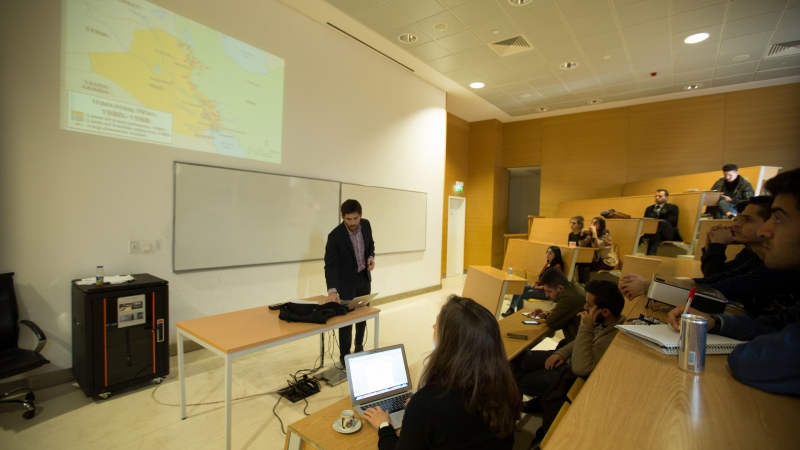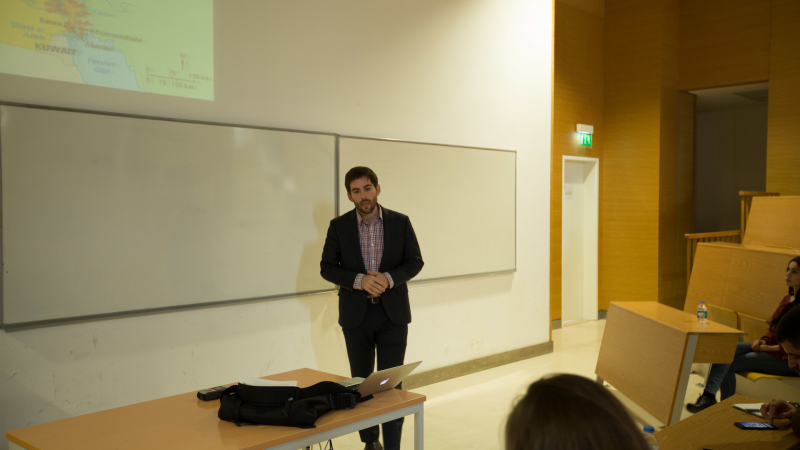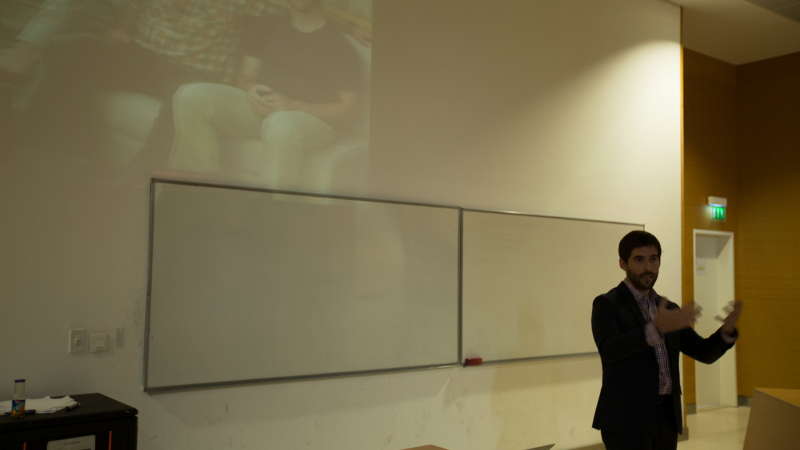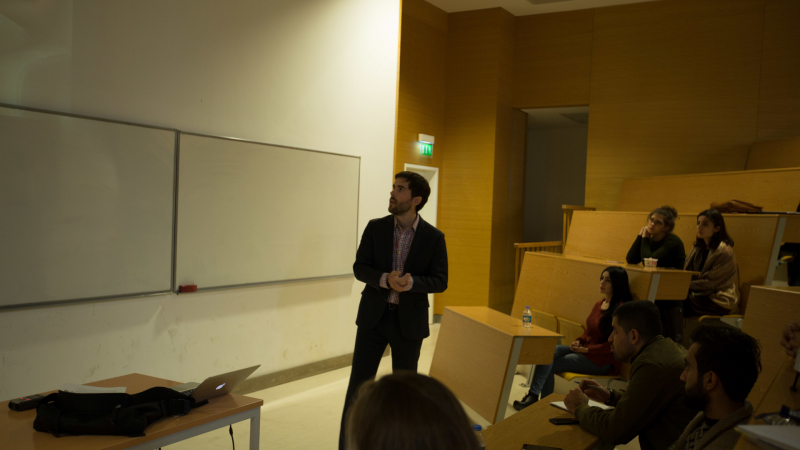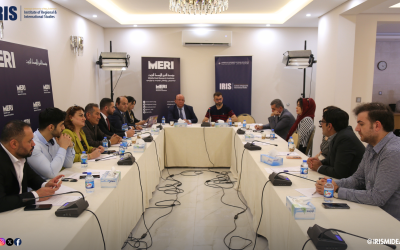On December 5th, 2016, IRIS fellow and PhD Candidate at John Hopkins University James ‘Mac’ Skelton gave a talk on the impact of war on Iraq’s healthcare system throughout modern history. Listen to the podcast here.
Skelton is a PhD candidate in Anthropology at John Hopkins University, in Washington, DC. He is conducting his doctoral fieldwork while at IRIS, splitting his time between Iraq and Lebanon, looking into Iraqis' experiences of cancer care and therapeutic travel post-2003. Prior to doctoral study, he was Senior Fellow at the Business Council for International Understanding. He holds an MA in Anthropology from the American University of Beirut and a BA in Religion from Davidson College. More information on his work and background can be found here.
Since the 1920s, the British mandate and, subsequently, the monarchy and Baath party saw the governance of the population as built on a strong national healthcare system. This translated into investment in medical schools, the posting of doctors all over Iraq, to both urban and rural areas, and the purchase of high-tech diagnostic and therapeutic equipment. By 1980, Iraq’s healthcare system was unrivaled in the Middle East.
But successive wars considerably changed the situation, at times hindering state-led efforts to build a strong national healthcare system. Skelton’s main claim is that the impact of war on a healthcare system varies greatly depending on the particular modalities of violence used for warfare. In other words, not all wars are created equally, and, as Skelton proceeded to show, nowhere is this more evident than in Iraq.
1980-1988: The Iran-Iraq War
The Iran-Iraq war was characterized by a nearly exclusive use of ground troops on both sides –with a few notable airstrikes – and was geographically confined to the areas adjacent to the border. This, Skelton claimed, had the effect of leaving the healthcare system generally intact, if not improved.
Two major factors, Skelton argued, account for the advancement of Iraq’s medical system in the 1980s: (1) Saddam Hussein’s purposeful policy effort to retain physicians, which materialized through travel bans and the accrued provision of trainings; and (2) heavy investments in surgical capacities to cope with massive waves of patients returning from the battlefield with broken limbs and blast injuries.
1990-91 and 1991-2003: The Gulf War and the sanctions period
On the other hand, the destruction of infrastructure was the main form of violence employed during the Gulf War. This had important consequences for the Iraqi healthcare system. Hospitals were, Skelton said, “left in shambles” due to lack of services and impeded road access. The dismantlement of water, sanitation and electricity systems also caused increases in diarrhea and war born diseases, further pressuring the system.
The following years saw the application of harsh sanctions –a comprehensive import ban –imposed on Saddam Hussein’s regime. This effectively translated into food shortages leading to chronic illness among the population. Hospitals were also prevented from importing medical equipment such as CT scans, radiotherapy machines, and analgesics, as well as a wide range of medication products. Doctors and activists from Iraq and abroad decried the situation, highlighting flaws in the UN sanctions system.
2003-2011: American invasion and occupation
The invasion and occupation brought a new set of complex challenges to the table, such as what Skelton calls the militarization of healthcare, whereby hospitals became part of the operations of war, blurring distinctions between civilian and non-civilian spaces. Hospitals effectively lost the ‘safe haven’ status they had benefitted from and started being used and targeted by both foreign forces and militias.
Population, and physician, exodus ensued. Starting in 2005-06, it is estimated that more or less 50% of Iraq’s doctors migrated –either abroad or to the Kurdistan Region of Iraq (KRI). The KRI’s healthcare system in that way benefitted from instability in the south through the recruitment of highly qualified medical personnel.
This translated into a shift in the geography of healthcare in Iraq, which gradually broadened from a national to a regional scale. From 2005 onwards, people started relying on Baghdad less and less for healthcare and Iraqis started to seek treatment in the KRI and abroad. Movement became key to healthcare.
2014-Present: The war against ISIS
The most important consequence of the war against ISIS in Iraq for the country’s healthcare system is that it has heavily impacted what Skelton calls ‘healthcare journeys.’ Post-2003, Iraq’s healthcare system became completely reliant on mobility and movement – either by car or plane, often both. In this context, the rise of ISIS in 2014 and of ethno-sectarian militia groups throughout the country has impeded this movement and hence access to healthcare for Iraqis.
Lessons from Skelton’s research highlight the intersection of security policy and access to healthcare, in terms of consequences of the former on the latter. Skelton in fact concluded by recounting the story of one of his research subjects, a cancer patient from Salahaddin, Iraq. As a Sunni Arab, it became increasingly difficult for him to travel to Baghdad for treatment following the ISIS advances of 2014. He then turned to Sulaimani for cancer radiation treatment. Recently, however, following a security incident that sparked a tightening to security measures, he was denied access to the KRI at a checkpoint.
War-related security policies, intended to protect citizens, have obstructed –and are likely to increasingly obstruct –the ability of Iraqis to seek healthcare.
For more on war and healthcare in Iraq:
Dewachi, O., Skelton, M., Nguyen, V. K. et al. (2014). Changing therapeutic geographies of the Iraqi and Syrian wars. The Lancet, 383(9915), 449-457.
Skelton, M., (2013) Health and Healthcare in Iraq: The Example of Cancer and Oncology. The Watson Institute for International and Public Affairs. Brown University.

